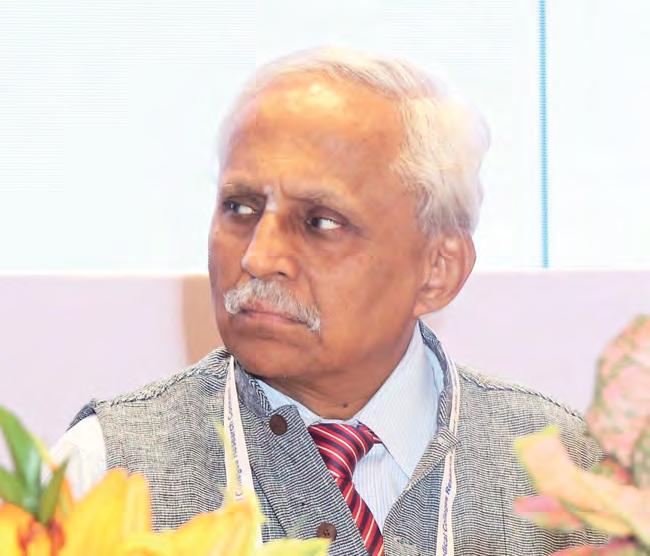Essayer OR - Gratuit
‘Friendly handshake, less policing': NMC chief's mantra to regulate medical colleges
Careers 360
|June 2025
BN Gangadhar was appointed head of the National Medical Commission (NMC), the apex regulatory body for medical education and profession, last July, after serving as the commission’s officiating chairperson and head of its Medical Assessment and Rating Board. He speaks to Musab Qazi about expanding medical education opportunities, enforcing standards and student well-being, faculty shortage, stipends and more. Edited excerpts:

Q. What have been your priorities for medical education since you took over as NMC chairperson?
A. The most important thing is ensuring quality in medical education. The second priority is quality, and it is also the third priority. At the same time, we need to meet the social demand as more and more people are aspiring to join the medical profession. We have to increase the number of seats and colleges. In order to meet doctors’ aspirations, we must create more opportunities for specialisations — PG seats. This will enhance human resources in the medical profession.
The opportunities to learn clinical skills come only with quality clinical care. Although there are many stakeholders in clinical care, we are doing our part. There are three important ingredients for quality medical education: happy students, committed teachers and satisfied patients - not necessarily in that order.
And of course, there’s another concern in the public mind: we have to be clean in our affairs.
There’s a sizeable clinical population available for students to learn from, but we have not been able to tap even 50% of clinical resources for teaching. The consultants and specialists are supporting clinical work in medical colleges and this will improve healthcare in the hospitals attached to them.
Hence, we are facilitating the transformation of specialist doctors into faculty. With minimal training, specialists and consultants can serve as teachers as we want to increase the quantity.
Q. There's a sense among some that pursuing both quality and quantity is inherently contradictory. How can you strike a balance between the two?
A. It's common sense that simply increasing the quantity won't do. We believe in ensuring adequate quality in training of UG and PG students and, at the same time, providing the best clinical care to patients.
Cette histoire est tirée de l'édition June 2025 de Careers 360.
Abonnez-vous à Magzter GOLD pour accéder à des milliers d'histoires premium sélectionnées et à plus de 9 000 magazines et journaux.
Déjà abonné ? Se connecter
PLUS D'HISTOIRES DE Careers 360

Careers 360
Why all 4 pillars of education matter
Translation: A quarter of knowledge comes from the teacher, a quarter from one's own effort, a quarter from peers, and the final quarter through experience over time.
4 mins
August 2025

Careers 360
AI IN EDUCATION REVOLUTIONISING TOWARDS EDUCATION 4.0
AI has the power to transform the educational landscape of today, solving some of the biggest challenges of modern-day education. The transition from conventional teaching and learning methods to an AI-enabled or tech-enabled learning is observed in many domains of study, including secondary to senior secondary education as well as college education.
4 mins
August 2025

Careers 360
Introspection, contemplation as important as 'outwardfocused inquiry' in learning
NEP offers an opportunity for Indian educators to blend intuitive wisdom with modern teaching to transform classrooms into holistic learning spaces, write the CBSE secretary and a Delhi Government school leader
6 mins
August 2025

Careers 360
Promises vs Provision: Public funding in NEP 2020 framework
Five years after NEP's launch, India's education spending stagnant at 4.1% of GDP - far below the promised 6% - while declining scholarships, fund shift towards elite institutes, and rising student debt challenge the policy's vision of inclusive education
5 mins
August 2025
Careers 360
Education's Heroes
In India, education is shaped not only by policies and institutions but also by the people who refuse to accept inequality as the norm. They come from courtrooms, laboratories, medical colleges, village squares, and city streets, bound by a belief that learning must be a right for all, not a privilege for a few. Some take on entrenched systems through litigation and advocacy; others create small but lasting change through libraries, community classrooms, and grassroots campaigns.
13 mins
August 2025

Careers 360
Relevance of engineering in the age of AI
Which college? Which branch? These questions plague millions of students entering higher education every year.
3 mins
August 2025
Careers 360
NEP 2020 How Far Have We Come?
The business of policy-making for education is the business of nation building.
16 mins
August 2025

Careers 360
Learning beyond the classroom
In every age, engineering has been the engine of transformation.
3 mins
August 2025

Careers 360
'We operate on trust, but there are consequences for dishonesty'
Anil Sahasrabudhe, chairman of National Educational Technology Forum (NETF), the executive committee of National Assessment and Accreditation Council (NAAC), and National Board of Accreditation (NBA), speaks with Aeshwarya Tiwari about the reforms in accreditation bodies, global accreditation standards, NIRF rankings, 'One Nation One Data' initiative, and more. Edited excerpts below
12 mins
August 2025
Careers 360
India needs 10 times the number of audiologists it has
The Bachelor of Audiology and Speech Language Pathology degree can open many career avenues, its placement records are stellar and salaries, generous. It needs better promotion
5 mins
June 2025
Listen
Translate
Change font size

